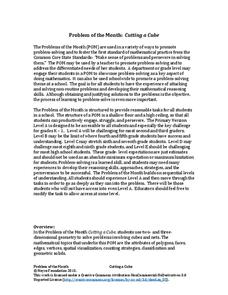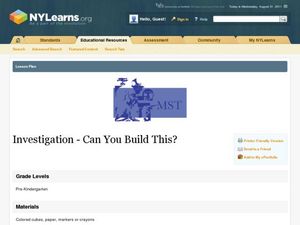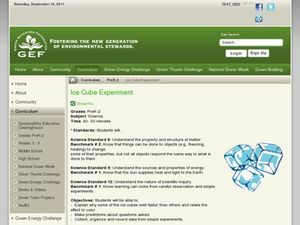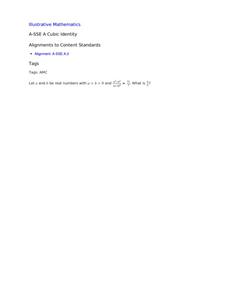Curated OER
Sums and Difference of Cubes
Learners factor polynomials using the sum and difference of cubes. They also learn connections between the graph and expression.
Curated OER
Connecting Cube Structures (C)
In this connecting cube structures practice worksheet, students solve 4 problems that require them to use connecting cubes to build the pictured structures.
Normal Community High School
Crystalline Structure
Cubic crystals can have 6, 8, and even 12 sides. Here is a presentation that shows pupils three different kinds of cubic crystalline structures: cubic, body-centered, and face-centered. These structures are then applied to three...
Noyce Foundation
Cutting a Cube
Teach the ins and outs of the cube! A series of five K–12 level activities explore the make-up of the cube. The beginning lessons focus on the vocabulary related to the cube. Later lessons explore the possible nets that describe a cube....
Curated OER
Connecting cube Structures
In this cube structure worksheet, students use connecting cubes to build structures shown in pictures. One picture is shown from 2 different angles.
Curated OER
Connecting Cube Structures
In this cube worksheet, students use connecting cubes to build structures pictured on worksheet; bottom structure is shown from 2 different angles, 4 structures total.
Curated OER
Connecting Cube Structures [E]
In this cube worksheet, students use connecting cubes to build structures pictured on the worksheet, 3 structures total. The bottom structure is shown from 2 different angles.
Curated OER
Investigation--Can You Build This?
Early learners explore shapes using colored blocks. They first get some hands-on time with the blocks and then look at beginning math concepts regarding spatial relationships. They work with a partner to build a 6-8 block tower with...
EngageNY
Linear Transformations Applied to Cubes
What do you get when you combine a matrix and a cube? Well that depends on the matrix! Pupils use online software to graph various transformations of a cube. Ultimately, they are able to describe the matrix that is responsible for a...
Curated OER
Ice Cube Experiment
Students explore the rate at which ice melts. In this science lesson, students place ice cubes on colored index cards and place them in direct sunlight. Students observe which ice cubes melt fastest and slowest.
Noyce Foundation
Cubism
If cubism were a religion, would you follow it? Lower-level tasks focus primarily on counting the number cubes in a structure and relating the number to surface area. As learners progress to higher-level tasks, isometric drawings and...
American Chemical Society
The Same Parts Can Make Many Objects
Snap to it! Young experimenters use Snap Cubes to model how a larger object is created from a smaller parts. Using a guide, they rearrange their cubes to create all possible arrangements of four and five cubes.
Curated OER
Solving Polynomial Equations
This worksheet and tutorial explores solving more complex polynomials by graphing each side separately and finding the point of intersection, identifying the sum and differences of cubes, and solving higher degree polynomials by using...
Curated OER
Amazing Triangles
Student scientists investigate triangle structures. In this building lesson plan, young scholars explore how to design triangle braces in the construction of structures in order to build a stronger base.
Curated OER
What's My Structure
Fourth graders use the language of mathematics to describe in words a 3-D structure created with one-inch cube. They interpret a written description of a 3-D structure and re-create it with one-inch cubes. Students use Quick Time...
Curated OER
Introduction to Minerals
Students discover how crystal structures go together to create minerals. In this earth science lesson, students work in groups to create 3-dimensional shapes of crystals that they then put together in a compact structure.
Curated OER
New Boxes From Old
Students find the volume and surface area of a rectangular box (e.g., a cereal box), and then figure out how to convert that box into a new, cubical box having the same volume as the original. As they construct the new, cube-shaped box...
EngageNY
Mastering Factoring
Math class is full of drama—there are so many problems to work out! Pupils work out factoring problems. They use quadratic methods of factoring higher degree polynomials, in addition to factoring the sum and difference of two cubes.
American Museum of Natural History
Grow Rock Candy
The best way to study crystals is to make your own! A hands-on lesson shows learners how to make their own rock candy from household materials. While they watch the crystals grow, they discover their structure and can even eat their...
Lincoln Public Schools
Cell Exploration Activities
Engage young biologists in exploring the mysteries of life with this collection of hands-on activities. Enlisting the help of numerous digital resources, students get an up-close look at the structure of plant and animal cells as they...
Exploratorium
Building Three-Dimensional Structures
Are you looking for a good 3-D geometry lesson that includes hands-on activities for your middle schoolers? Look no further than this one! Pupils use centimeter grid paper embedded in the plan, along with detailed construction...
Teach Engineering
Connect the Dots: Isometric Drawing and Coded Plans
Individuals discover how to draw cubes on triangle-dot paper. They use cubes to build structures and draw corresponding isometric drawings on dot paper in the second lesson of the series of five. The activity also introduces the concept...
Illustrative Mathematics
An Integer Identity
Challenge algebra learners to use the difference of cubes to solve this problem. Once your charges have taken out the factor (a - b), combined the like terms and set them equal to zero, the problem becomes a factorable quadratic...
Curated OER
Cubes Everywhere
Students use cubes to construct and visualize two-and three-dimensional shapes to develop spatial thinking and review basic geometric principles through real-life applications. They are given the opportunity to build and build and take...








![Connecting Cube Structures [E] Worksheet Connecting Cube Structures [E] Worksheet](http://content.lessonplanet.com/resources/thumbnails/216860/large/cgrmlwnvbnzlcnqymdezmdmzms0xmta4ny00mtnynhauanbn.jpg?1414306938)
















